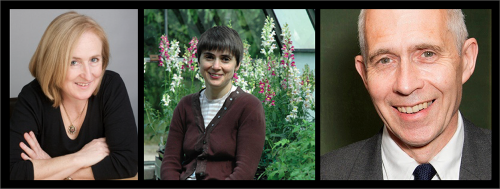Honouring developmental biology
Posted by the Node, on 12 January 2017
The New Year’s honours list recognises citizens who have made achievements in public life and committed themselves to serving and helping Britain.
This year three prominent developmental and stem cell biologists were honoured, putting our field in the national news. The Development team were especially happy that two of the newly honoured researchers have connections to the journal: Sir Jim Smith was Development’s Editor in Chief from 2003-2009, and Dame Ottoline Leyser is currently one our editors. Dame Amanda Fisher has also been recognised for her contributions to stem cell and HIV research. The recognition of all three also includes their promotion of women in science.

Ottline Leyser’s bio from the page announcing the awards
Professor (Henrietta Miriam) Ottoline Leyser CBE Professor Leyser, Director of the Sainsbury Laboratory at the University of Cambridge, is an inspirational scientist who has made seminal contributions to plant biology with direct implications for agricultural crops. Among many other awards, she was given the 2016 Genetics Society Medal in recognition of her work which has maintained the UK’s scientific leadership in this field. She was President of International Plant Molecular Biology and is a Foreign Associate of the US National Academy of Sciences. She has been a passionate advocate of career development for young researchers, especially women, and won the Royal Society’s Rosalind Franklin Award in 2007 for her proposal on combining a research career and a family.
Jim Smith’s bio
Dr. Smith, Director of Science at the Wellcome Trust and Senior Group Leader at the Francis Crick Institute, is a scientific leader who has transformed our understanding of embryonic development, giving insights into genetic defects in children and how stem cells develop into different tissues. He played a leading role in the development of the Francis Crick Institute from its early beginnings to its establishment in 2015. Previously, as Director of the Gurdon Institute and then of the MRC National Institute for Medical Research, he provided leadership in UK science across a breadth of disciplines and helped nurture the next generation of outstanding scientists, taking particular care to promote the careers of women.
Amanda Fisher’s bio
Professor Fisher, Director of the MRC Clinical Sciences Centre at Imperial College, London, has made fundamental discoveries in the molecular biology of HIV, the genomic characterisation of stem cells and the study of epigenetic gene regulation. Her observations of the HIV-1 virus underpinned the complete molecular understanding of the HIV genome and were a basis for the subsequent development of antiretroviral drugs. She is a strong advocate and role model for women in science and has made a significant contribution to the public understanding of science and training and mentoring researchers.

Many developmental biologists have also benefited from the technological advances made by another newly recognised Knight, Shankar Balasubramanian
Professor Shankar Balasubramanian Professor Balasubramanian, Herchel Smith Professor of Medicinal Chemistry at Cambridge University, was co-inventor of Next Generation DNA sequencing, the most transformational advance in biology and medicine for decades. Solexa sequencing, as it is now known, allows an individual genome to be sequenced in a day or two at a cost of less than £1000; previously, sequencing the human genome took years of work and cost billions. His work has spawned an entirely new discipline of Bioinformatics. More recently, he has made major contributions to understanding the role of DNA-quadruplexes in cancer and invented a method for the sequencing of epigenetic modifications.
Congratulations to the newly honoured!


 (3 votes)
(3 votes)